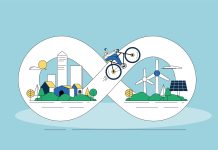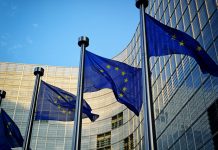Here, Raimund Bleischwitz from University College London, Bartlett School of Environment, Energy and Resources (UCL BSEER), proposes a Green New Deal for Europe
Many voices say there is crisis all over – and mistrust in politicians and politics. But is it all that bad? The new European Commission sends a strong signal of collaboration and bold ambitions. It is good to see three competitors for the presidency – Ursula von der Leyen, Frans Timmermans, and Margarethe Vestager – now rallying behind one banner. Most European citizens want the Union to become a beacon of sustainability, a place that respects the rights and livelihoods of all its citizens and the environment. Smart and comprehensive strategies are needed.
We propose a Green New Deal as both a new mission and a programme that brings jobs and quality of life to the people. The internal and external conditions to deliver are challenging; but we believe there is actually now a spirit and a momentum that could overcome constraints and unleash opportunities.
What is Green in a New Deal
Summer heatwaves, storms and flooding indicate climate change as a common threat. Hardly anyone will be able to escape hothouse conditions and mitigate risks. Thus, a net zero carbon target is a ‘must have’ for the future of Europe. But there’s more to it – for change to happen, one needs positive visions and trigger collective aspirations. Ensuring access to modern energy services, affordable housing, smart mobility, clean water and healthy food is good for people, profits and the planet.
To achieve such goals, companies and countries ought to decouple their current key performance indicators such as ‘Earnings before interest, tax, depreciation and amortization (EBITDA)’ and GDP from natural resource throughput. Measuring carbon footprints and other footprints for water, land and materials is well established and improves resilience of supply chains.
We propose a European reduction of those footprints in line with the Paris Agreement and necessary pollution abatement. Doing so requires close coordination among several government ministries, local authorities and industry, including buildings and construction, energy, agriculture, and transport. The vision would be a circular economy, one that is restorative by design and maintains both private and public values in line with planetary boundaries and the SDGs.
Leaving no-one behind
Surely, deep transformations are required. As experience with earlier transitions in Central and Eastern Europe and many modernisation efforts reveals, the risk of people feeling left behind should be minimised. Existing inequalities hinder human capabilities to flourish, be it for reasons of discrimination, or power dynamics, poor design of change programmes, or imbalanced financing. Why should poor people pay taxes to support photovoltaic installed on houses for the rich?
We propose a deliberately asymmetric deal: put the lower half of the people first. Key workers in health, mobility, education and security deserve to be treated with respect and receive favourable conditions. Urban transformations and rural strategies require participatory planning to identify and address the needs of the poor and the lower half of societies. People can be involved via concepts of ‘citizen science’ and, indeed, via social media. If done well, the future digital revolution holds further promises for participation and leaving no-one behind. It will be of utmost importance to include those criteria in revised European regional policies and investments.
Subsidiarity and diversity
It’s been cheap in the past to blame ‘Brussels’ – and not entirely without reason. Complementing Ann Pettifor’s proposals on macro-economy, a Green New Deal must come with a bottom-up dynamic, with more polycentric governance, and creativity through experimentation and smart assessments. Business roundtables in regions that involve a range of stakeholders do exist.
The EU project ‘Recreate’ has developed Evidence-based narratives (EBNs) in areas such as Climate Information Services; Nature-based Solutions; Systemic Eco-innovation to Realise a Circular Economy; Sustainable Urban Material Management; Sustainable Urban Infrastructure Systems; Sustainable Urban Adaptation and Resilience that await upscaling and horizontal dissemination across European regions. The data revolution will help to connect people with smart business and governments.
Smart enablers – incentives and three programmes
Economic incentives are needed, both to enable more human productive activities and to end unproductive waste of resources. A smart combination of carbon emissions trading and carbon taxes are a good way forward, in order to focus on key industries and reach out to more dispersed emissions. For a more holistic green new deal, we also propose a moderate tax on construction materials that could boost markets for secondary materials and also help to safeguard access to mineral deposits of public importance.
All this can and should be done in ways that benefit the people. We propose three large programmes for a green new deal:
Sustainable and inclusive housing, with renovation towards net zero carbon and new models of sharing;
Smart mobility, with investments in public transportation and high-speed rail and lowering total costs of access, perhaps via a European smart card;
Healthy food, with regional and sustainable supply, social kitchen, and food waste reduction.
Europe wouldn’t walk alone
China, Canada, New Zealand and others are on their way too; a Green New Deal is also a huge debate in the USA – perhaps for a future President, or indeed for numerous states. Whatever happens in the UK and its delicate relationship with the EU: The parliament is committed to net zero carbon, and a new wave of industrial policy with a strong emphasis on green growth and a circular economy is on the way, especially in Scotland.
In line, we propose international alliances to learn and scale up solutions. The Chinese Belt and Road Initiative starts to connect Asia and Europe and other parts of the world. A Green New Deal could help creating clean value chains and good regional and international neighbourhoods.
*Please note: This is a commercial profile











